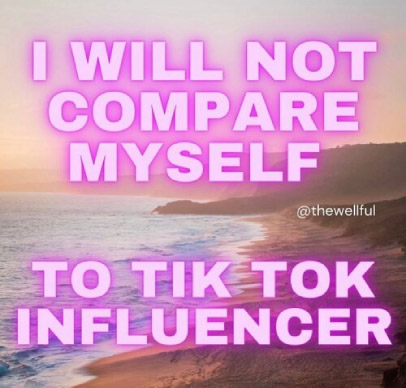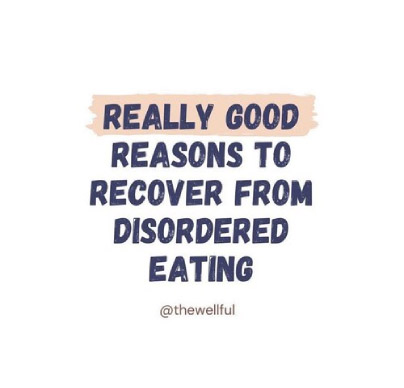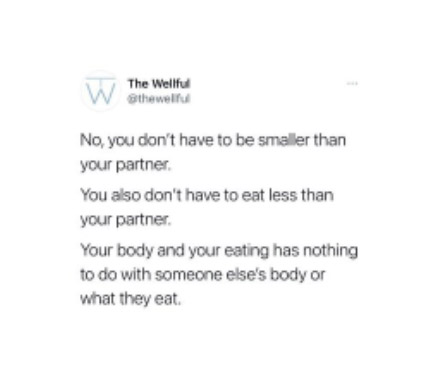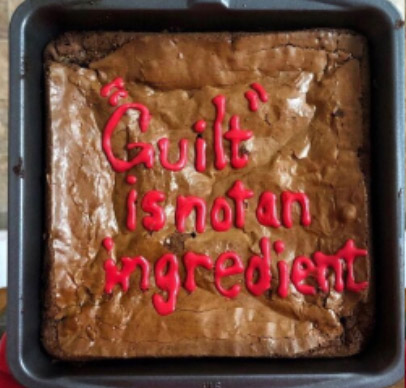It’s no secret that we live in a world where appearances and – and off – social media significantly play a major role in our lives. The concept of body image has become increasingly prevalent, but what exactly does “body image” mean? Why does it matter? This post discusses the definition of body image, the role it plays in our daily lives, how it intersects with our relationship with food, and how body image can influence your physical and mental health.
What Is Body Image?
Most of us have an idea of what body image is, but it’s still a good idea to get back to the basics of its definition. Body image is the perception and feelings you have about your own body. This multifaceted concept involves your thoughts, emotions, attitudes, and behaviors regarding your physical appearance. Your body image can also be influenced by how you are treated in the world, how easy it is to find clothes that fit your body, sit in seats that are comfortable, feel welcomed and included in social settings.
Exploring the Definition of Body Image
When we talk about body image, it’s helpful to think of it through two lenses:
- Perceptual Body Image: This is how you see your body when you look in a mirror or a photo. It may be influenced by distortions (i.e., what you tend to zone in on rather than seeing the overall picture).
- Affective Body Image: This refers to the emotions you associate with your body, whether positive, negative, or neutral.
Body image is your inner picture of yourself. It’s not static. Your body image can change based on the day (sometimes the time of day), your emotional state, the people you surround yourself with, and so many other factors. A prevailing diet culture and beauty narrative is that people in smaller bodies have more positive body image and that people in bigger bodies have more negative body image – this is not true. People in all body sizes can have varying degrees of body image.
How Body Image Affects Your Mental Health
It goes without saying that your body image can impact your mental health, but how exactly? Many studies have been conducted on the link between body image and mental health struggles, specifically with regards to depression, anxiety, and eating disorders. We’ll break that down for you here.
- Depression: Poor body image can contribute to symptoms of depression, sometimes resulting in a diagnosis of major depressive disorder (MDD). Experiencing weight stigma or shame can also lead to feelings of isolation, decreased self-esteem and decreased self-image.
- Anxiety: Concerns about appearance often increase feelings of anxiety, which may complicate social interactions and feelings of loneliness.
- Eating Disorders: Negative body image is often a precursor to eating disorders like anorexia nervosa, bulimia nervosa, binge-eating disorder, as well as strict food rules and dieting.
Improving Your Body Image
The first step to healing your relationship with your body is to understand the root of your dissatisfaction. The second step is to get reflective, to get curious, and to take action. I’m here to work with you on that journey. Here are some starting places that I’ll often explore with clients and you can explore on your own, too!
A first step to better understanding your body image is identifying the factors that influence your body image throughout the day or week. Keep a journal or make a mental note when you notice positive, neutral or negative body image thoughts. Some common influences are: getting dressed, seeing pictures of yourself, feelings of hunger or fullness, or being around someone who engages in diet or body talk.
Self-Reflection
After you notice what influences your body image, the next challenge is to reflect on your body-related thoughts and feelings and get curious. Where did these come from? Who benefits from these beliefs or narratives? How is this narrative helpful to you? How is it not so helpful to you? What would it be like if this narrative changed?
Surround Yourself with Positive Influences
Having inclusive people in your support system can help you develop a better body image. A positive environment that embraces Health at Every Size (HAES)®can enhance self-esteem and body image and bring you more peace all around. This could look like a friend who you hang out with and vent about diet culture, someone who doesn’t talk negatively about bodies or weight, finding an online community where you feel validated and less alone, setting boundaries around diet talk with family members and seeking out groups that are body positive and weight-inclusive.
Practice Self-Compassion
Practice kindness towards yourself, avoiding self-criticism. Respond to negative thoughts as you would if your best friend was criticizing themself. What would you say to them? Can you say that to yourself?
Seek Professional Support
If body image issues significantly affect your mental or physical health, consider seeking help from a registered dietitian nutritionist. Here at The Wellful, we want to help you reclaim your relationship with your body and challenge negative self talk. You deserve to feel more peace feel better both in and about your body.
The Wellful: Your Ally Towards a Better Body Image
Achieving a better body image doesn’t come from hitting a number on a scale. (Remember people in all body sizes can have varying degrees of body image.) At The Wellful, we offer a support environment that helps you have more tools, support and resources to navigate diet culture, pressures on body image and improve your relationship with your body and yourself. If you’re looking to improve your body image, we want to work with you.
Call us at (925) 725-2761 or send an email to brenna@thewellful.com for more information.










